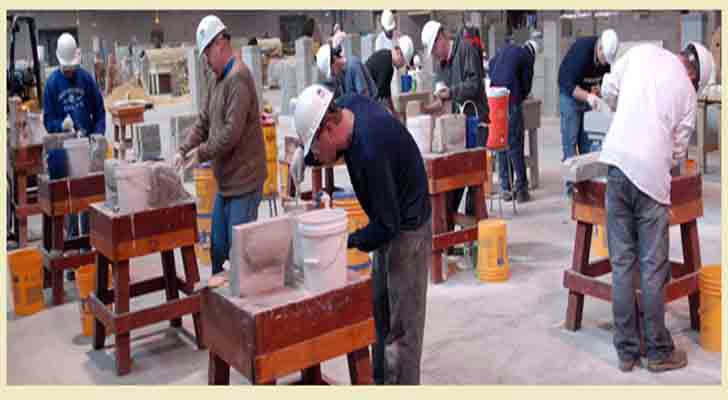Why Choose the U.S. Department of Labor's Masonry Apprenticeship Program?
The U.S. Department of Labor's masonry apprenticeship program offers a highly effective path for individuals looking to enter the construction industry. With professional skill development, paid training, industry-recognized certification, and employment support, this program ensures that participants become fully qualified masons in a short amount of time. Let’s explore the key reasons why this program is a standout choice.

1. Professional Training to Master Essential Skills
The masonry apprenticeship program is designed to equip participants with the critical skills required in the construction industry. From bricklaying and material handling to wall and floor repairs, the program covers a broad range of masonry techniques. In fact, according to the Bureau of Labor Statistics (BLS), construction workers, including masons, are expected to experience job growth of about 5% from 2020 to 2030, reflecting a steady demand for skilled tradespeople in the industry.
The program offers a blend of classroom instruction and hands-on experience, which helps participants not only understand the theory but also apply it in real-world situations. This practical training ensures that participants are job-ready by the end of the program, providing them with the tools to succeed in various masonry roles across the construction sector.
2. Open to Ages 16 to 75
One of the unique aspects of the U.S. Department of Labor's masonry apprenticeship program is its inclusivity. The program is open to individuals aged 16 to 75, which allows people from different backgrounds and stages of life to participate. This broad age range opens up opportunities for young adults looking to start a career, as well as for older adults who may want to switch professions or earn a more stable income.
The construction industry is projected to add approximately 305,000 new jobs between 2020 and 2030, many of which will be in skilled trades like masonry. This growth means that regardless of age, there are increasing opportunities for individuals to secure stable and lucrative positions in the construction industry.
3. Short-Term Training for Quick Career Entry
With a duration of only 4 to 6 weeks, the masonry apprenticeship program offers an efficient pathway to career entry. According to the U.S. Department of Labor, apprenticeships like this one offer a fast track to gain the experience and qualifications needed to excel in the trade. Short-term programs provide participants the ability to quickly acquire practical skills and start working, minimizing the time spent in training before entering the workforce.
Given the fast-paced nature of the construction industry, participants can immediately apply the skills learned in real-world settings. This allows them to quickly become valuable assets to employers and enhances their job prospects upon program completion.
4. Earn While You Learn: Paid Training
The program provides paid training, allowing participants to earn an income while they develop their skills. According to the National Apprenticeship Survey, nearly 91% of apprentices are employed within a year of completing their programs, and many report earning competitive wages that increase with experience. For example, as of 2023, the median annual wage for masons in the U.S. was $47,610, with top earners making over $80,000 annually. Paid training significantly reduces financial stress, enabling participants to gain experience without the burden of tuition fees or unpaid internships.
This "earn while you learn" model allows participants to support themselves financially while building practical skills, making it an attractive option for those entering the workforce or changing careers.
5. Certification and Industry Recognition
Upon completion, participants earn a certification from the U.S. Department of Labor, a credential widely recognized across the construction industry. According to the BLS, workers with certifications and apprenticeships tend to earn higher wages and have more stable employment opportunities. The certification validates the skills learned during the program, providing a competitive edge in a high-demand industry.
For instance, masons who hold certification and experience have access to a wide variety of job opportunities, ranging from residential projects to large-scale commercial constructions. Certification also helps participants negotiate better wages and job benefits, further enhancing their career trajectory.
6. Employment Assistance for Career Transition
The program also offers robust employment support services to help participants transition smoothly into the workforce. With the construction industry projected to grow by 5%, the demand for skilled masons is expected to remain strong, ensuring that program graduates have a wide range of job opportunities. Employment assistance includes job placement services, interview preparation, and resume building, helping participants find suitable employment soon after completing their training.
In addition, the BLS reports that employment in the construction industry tends to be relatively stable, even during economic downturns, as demand for housing, infrastructure, and renovation projects continues.
Conclusion
The U.S. Department of Labor's masonry apprenticeship program offers a comprehensive, efficient, and well-supported pathway into the construction industry. From professional training and paid learning to certification and employment assistance, this program is designed to equip participants with the skills and credentials needed to thrive in the field. With the construction industry expecting steady job growth and a high demand for skilled tradespeople, this apprenticeship provides an excellent opportunity for anyone looking to secure a long-term, rewarding career.
For more information, visit Learn more and search channels.
